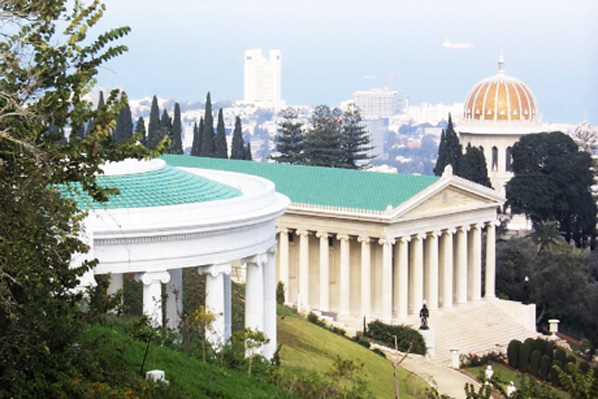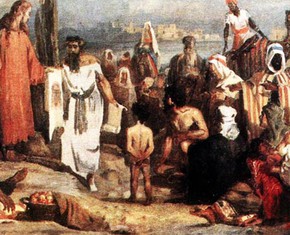The views expressed in our content reflect individual perspectives and do not represent the authoritative views of the Baha'i Faith.
When you encounter the Baha’i Faith, the newest world religion–whose existence may still come as a complete surprise for many people—you’ll learn a few new vocabulary words. Here we’ve compiled the most-used Baha’i vocabulary for your information:
Revelation—for Baha’is, a revelation isn’t just a book in the Bible. As Webster’s Dictionary defines it, a revelation is God’s disclosure of divine truth. The Baha’i teachings say God has given us several successive disclosures of divine truth throughout history, all part of one progressive revelation that continues to guide humanity. For Baha’is, God’s revelations do not compete with one another, but instead are all part of a single, ongoing, continuous and unified system of spiritual knowledge.
Dispensation—in theology, a dispensation means “the ordering of events under Divine authority.” For Baha’is, a dispensation simply describes the period of time while a revelation endures among humanity.
Manifestation—the great teachers, prophets and messengers of God; for example, Abraham, Moses, Buddha, Christ, Muhammad and Baha’u’llah. Baha’is believe that the prophets and messengers manifest or reveal God’s perfection and attributes on earth; encourage humanity toward a more spiritual life; and bring the same essential, spiritual message at different historical periods.
Baha’u’llah—the title of the newest manifestation of God, the founder and prophet of the Baha’i Faith, the most recent revelation. The word Baha’u’llah means “The Glory of God” in Arabic. Born Mirza Husayn Ali in 1817 in Persia, Baha’u’llah taught the oneness of God and of all religions, and proclaimed the unity of humankind. For those teachings, he spent forty years in exile and prison.
Baha’i—a follower of the mystical and practical spiritual teachings of Baha’u’llah.
Abdu’l-Baha—the son of Baha’u’llah, and his designated successor. The title Abdu’l-Baha means Servant of the Glory. Baha’is do not regard Abdu’l-Baha as a manifestation or prophet, but do respect his unique station as the true exemplar of the Baha’i Faith.
The Bab—the precursor and herald of the Baha’i Faith. The founder of the Babi Faith, whose title means “the gate,” was born Ali Muhammad in 1819 in Persia. Proclaiming his mission of alerting humanity to the advent of another manifestation, the Bab generated an enormous following between 1844-1850, when the Persian government and the forces of the Islamic clergy conspired to execute him.
Shoghi Effendi, the Guardian of the Baha’i Faith—the grandson of Abdu’l-Baha, appointed by him as his designated successor. Shoghi Effendi directed and administered the global affairs of the rapidly-expanding Baha’i Faith from 1921 to 1957, when he passed away.
Mount Carmel—the mountain in Haifa, Israel, which the prophet Isaiah called “the mountain of the Lord.” The Baha’i World Centre is situated on Mount Carmel, and includes several Baha’i holy places, as well as the Baha’i world’s administrative institutions. The Baha’i holy places, gardens and administrative institutions are situated there because Baha’u’llah and his family and followers were exiled to the prison colony nearby (in what was then Akka, Palestine) in 1868.
Kitab-i—Persian word for “book of,” used by Baha’u’llah as a title for the major books of his revelation, such as the Kitab-i-Iqan (Book of Certitude); Kitab-i-Aqdas (Book of Laws); Kitab-i-Asma (Book of Names). Baha’u’llah wrote more than a hundred volumes as part of his voluminous new revelation.
Allah’u’abha—A Baha’i greeting or invocation which means “God is most glorious.”
Tablet—divinely-revealed scripture. Both Baha’u’llah and Abdu’l-Baha revealed writings called tablets. The Baha’i Faith is the first of the major world religions to possess its founder’s actual writings. Many of these scriptures, books and tablets have been translated into multiple languages around the world.
Universal House of Justice—the democratically-elected body of nine Baha’is who administer the global Baha’i community.
Spiritual Assembly—whether Local or National, spiritual assemblies are democratically-elected bodies of nine Baha’is who administer the affairs of their respective communities. Almost every nation on earth now has a Baha’i National Spiritual Assembly.
Covenant—the agreement between a manifestation of God and humanity; also, the appointment and succession of Baha’i leadership that safeguards the unity of the Baha’is and guards against schism and sectarianism within the Baha’i Faith.
Feast—held on the first day of every Baha’i month, the Baha’i feast brings together the members of the Baha’i community for prayer, frank consultation, fellowship and socializing. Refreshments, music and fun often follow.
World Commonwealth; or World Order—the peaceful global society, which will help establish the unity of humankind, that all Baha’is work towards:
…a pattern for future society, a supreme instrument for the establishment of the Most Great Peace, and the one agency for the unification of the world, and the proclamation of the reign of righteousness and justice upon the earth. – Shoghi Effendi, The World Order of Baha’u’llah, p. 19.
Follow along with this occasional series if you’d like to familiarize yourself with the central figures, principles and themes of this remarkable new revelation.

















Comments
Sign in or create an account
Continue with Googleor